HONG KONG, Dec 20, 2024 - (ACN Newswire) - The leaders of National Association of Vocational Education of China visited Hong Kong, jointly sponsored by The Chinese Occupational Education Association of Hong Kong and co-sponsored by the Hong Kong Metropolitan University, organized Hong Kong Vocational Education Service in Joint Construction of the “Belt and Road" Vocational Education Symposium. It was held at the International Conference Center on the 12th floor of the Jockey Club Institute of Healthcare of the Hong Kong Metropolitan University on December 17, 2024. Mr. Feng Dajun, Deputy Director General of National Association of Vocational Education of China, and Wu Cheng, Deputy Director of Education and Science of the Liaison Office of the Central People's Government in the Hong Kong Special Administrative Region, attended the meeting.
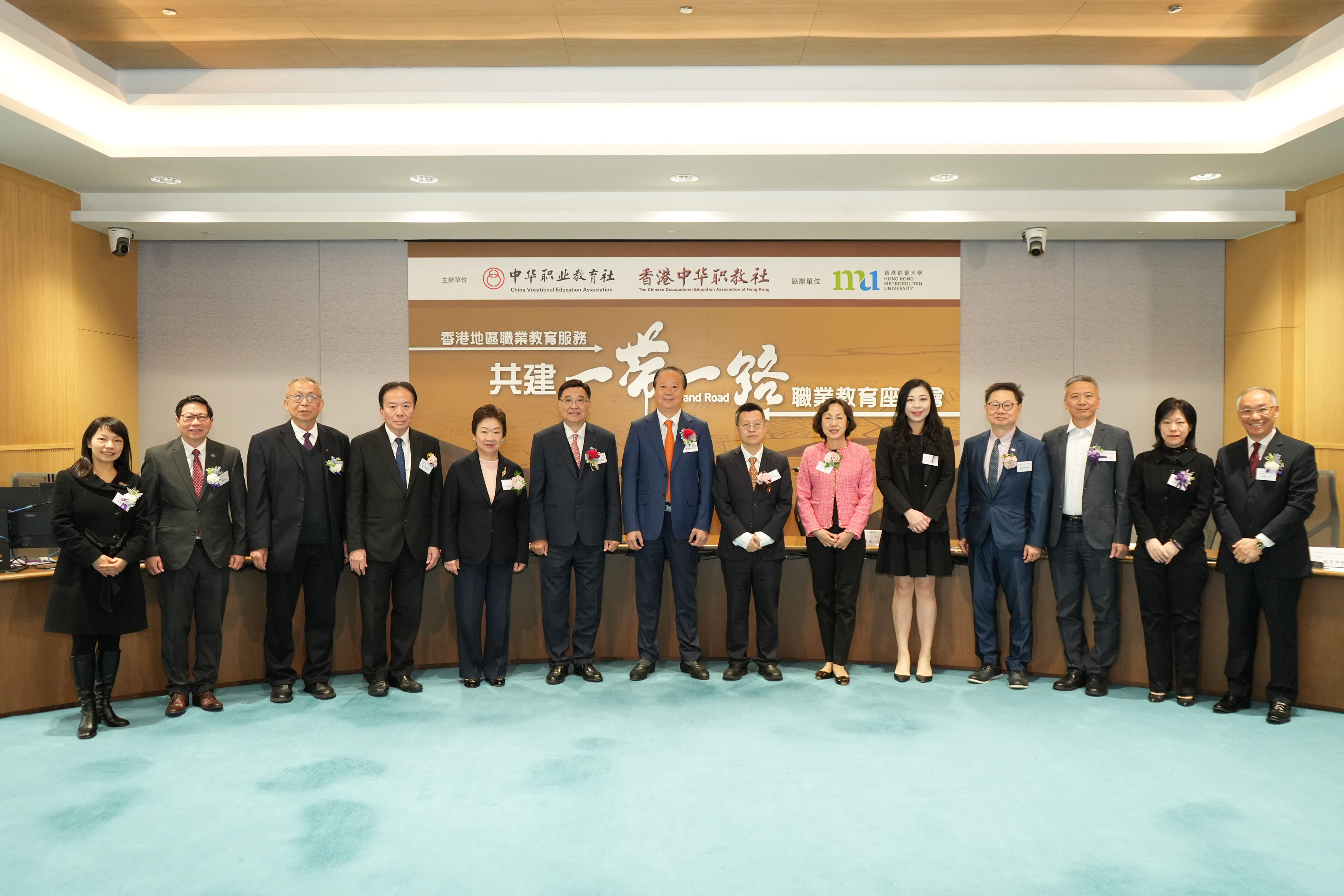 From Left: Professor Li Wai Chi, Mr. Cheung Kin Chung,Professor Zhao Pengfei,
From Left: Professor Li Wai Chi, Mr. Cheung Kin Chung,Professor Zhao Pengfei,
Dr. Wong Yau Kar, Madam Wong Wai Ching,Professor Wong Yuk Shan, Dr. Liu
YungChau, Mr. Feng Dajun, Madam Wu Cheng,Dr. Liu Yi Man, Professor Reggie
Kwan Ching Ping, Mr. Yiu Pak Leung,Madam Huang Zhaoxia, Mr. David Leung Yiu Fai
This symposium can be said to have a strong lineup of guests, with over 60 participants from various sectors including politics, business, and education. In addition to Dr. Liu Yung Chau, Honorary Chairman of the Council of the COEAHK, Professor Wong Yuk Shan, Chairman of the Council, Dr. Wong Yau Kar, Dr. Liu Yi Man, Vice Chairmen, and all other directors attending. Madam Wu Cheng, Deputy Director of Education and Science of the Liaison Office of the Central People's Government in the Hong Kong Special Administrative Region also attended.
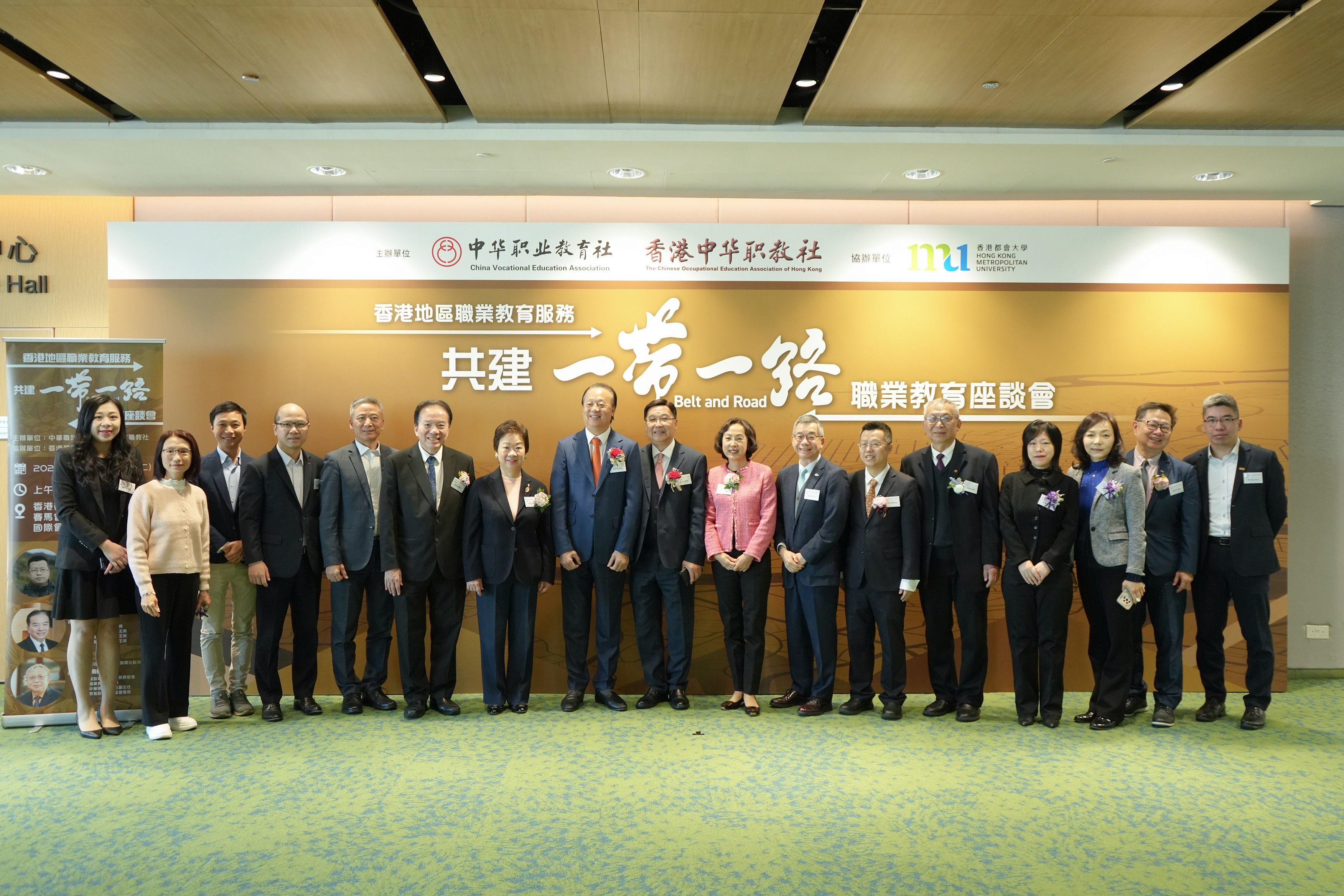 From Left: Dr. Liu Yi Man, Madam Gladys Yam Ying Sim, Mr. Lam Chun Sing ,
From Left: Dr. Liu Yi Man, Madam Gladys Yam Ying Sim, Mr. Lam Chun Sing ,
Mr. Wong Kam Leung , Mr. Yiu Pak Leung, Dr. Wong Yau Kar,Madam Wong Wai
Ching,Dr. Liu Yung Chau, Professor Wong Yuk Shan,Madam Wu Cheng, Mr. Tai
ChakTong, Mr. Feng Dajun, Professor Zhao Pengfei,Madam Huang Zhaoxia, Madam
LiMin, Professor Reggie Kwan Ching Ping,Mr. Tsui Hoi Shan
The meeting is divided into two parts. The first part is the keynote speech, and the second part is the symposium. From macro level to micro level, the government's policy is to jointly construct the "Belt and Road" and promote vocational education to overseas, and then how to implement the "apprenticeship system". Vocational education in Hong Kong is promoted by the government, enterprises, and schools, and the integration of industry and education, as well as school enterprise cooperation, are relatively international and market-oriented.
The first part is the keynote speech, delivered by Mr. Feng Dajun, Deputy Director General of the National Association of Vocational Education of China, on the topic of "Strengthening Exchange and Cooperation, Jointly Promoting Vocational Education Going Overseas". Dr. Wong Yau Kar, Vice Chairman of the COEAHK, delivered a keynote speech on the theme of "Advantages and Challenges of Hong Kong Vocational Education's Participation in the Joint Construction of the “Belt and Road". Dr. Zhao Pengfei, former president of Guangdong Construction Vocational and Technical College, gave a keynote speech on the topic of "Practice and Prospects of Chinese Characteristics Apprenticeship System under the Background of Industry Education Integration".
The second part is a guest speech, delivered by Dr. Liu Yi Man, Vice Chairman of the COEAHK, Mr. David Leung Yiu Fai, Chief Consultant of the MTR Academy, Professor Li Wai Chi, Vice President of HKCT Institute of Higher Education, and Mr. Chris Cheung Kin Chung, President of the CLP Power Academy.
in his opening remarks, reflected on the history of the China Vocational Education Society and pointed out the significant contributions of the Hong Kong Vocational Training Council since its establishment in enhancing vocational education.
Professor Wong Yuk Shan, in his opening remarks, stated that the National Association of Vocational Education of China was founded on May 6, 1917 in Shanghai by 48 renowned figures in the education and business sectors, including Huang Yanpei, Cai Yuanpei, and Liang Qichao. As for our COEAHK, it was officially established on January 12, 2024, at the age of less than one. It was founded under the initiative and strong support of Dr. Liu Yung Chau. COEAHK is committed to promoting and improving vocational education in Hong Kong, exploring and exchanging theories and practices of vocational education, promoting the spirit of craftsmanship, and facilitating the development of vocational education in Hong Kong and other cities in the Guangdong Hong Kong Macao Greater Bay Area. It aims to cultivate talents for innovation, modern industry, and service industries in the region.
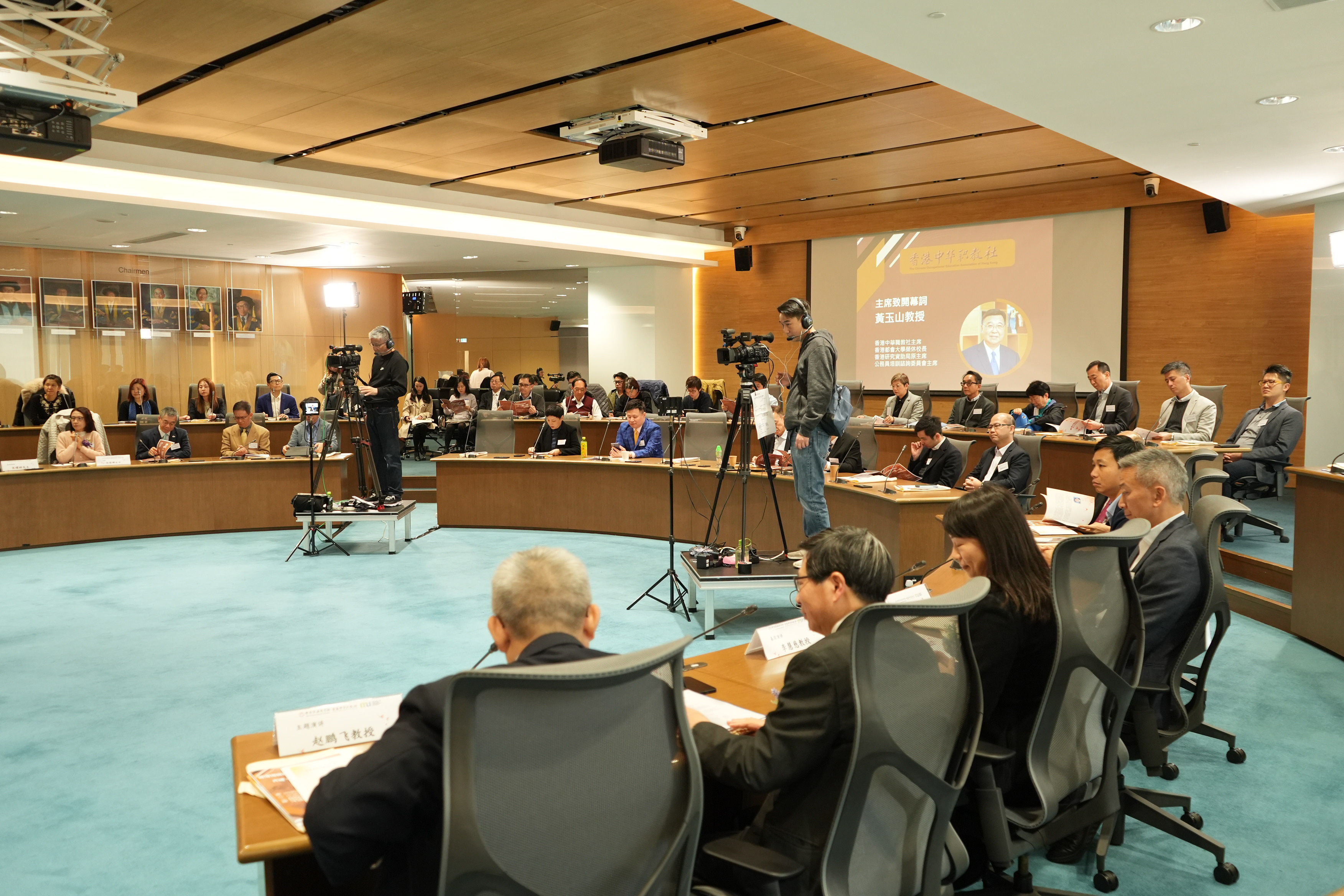 The guest lineup at the symposium was impressive, featuring around 60
The guest lineup at the symposium was impressive, featuring around 60
representatives from various sectors,including politics, business, and education
Deputy Director General Feng Dajun said that in September and October 2013, President Xi Jinping proposed the cooperation initiatives of the Silk Road Economic Belt and the 21st Century Maritime Silk Road respectively. By the end of June 2023, China has signed more than 230 cooperation documents on jointly building the "Belt and Road" with more than 150 countries and more than 30 international organizations. At present, China has launched "Chinese+Vocational Education" characteristic projects in more than 40 countries and regions, and more than 400 vocational colleges in mainland China and foreign educational institutions have cooperated in running schools. The number of full-time students studying in China has reached 17000. China's vocational education has established stable connections with over 70 countries and organizations. In the process of exchange, vocational colleges in the mainland and universities in Europe, Africa, Thailand and other countries along the Belt and Road have carried out vocational education projects. National Association of Vocational Education of China has always played an important role in promoting the Belt and Road Initiative. Hong Kong's vocational education has a flexible education and training mechanism, an open market school running mode, and an international talent training orientation. It has prominent regional advantages in the international exchange and cooperation of vocational education along the “Belt and Road”.
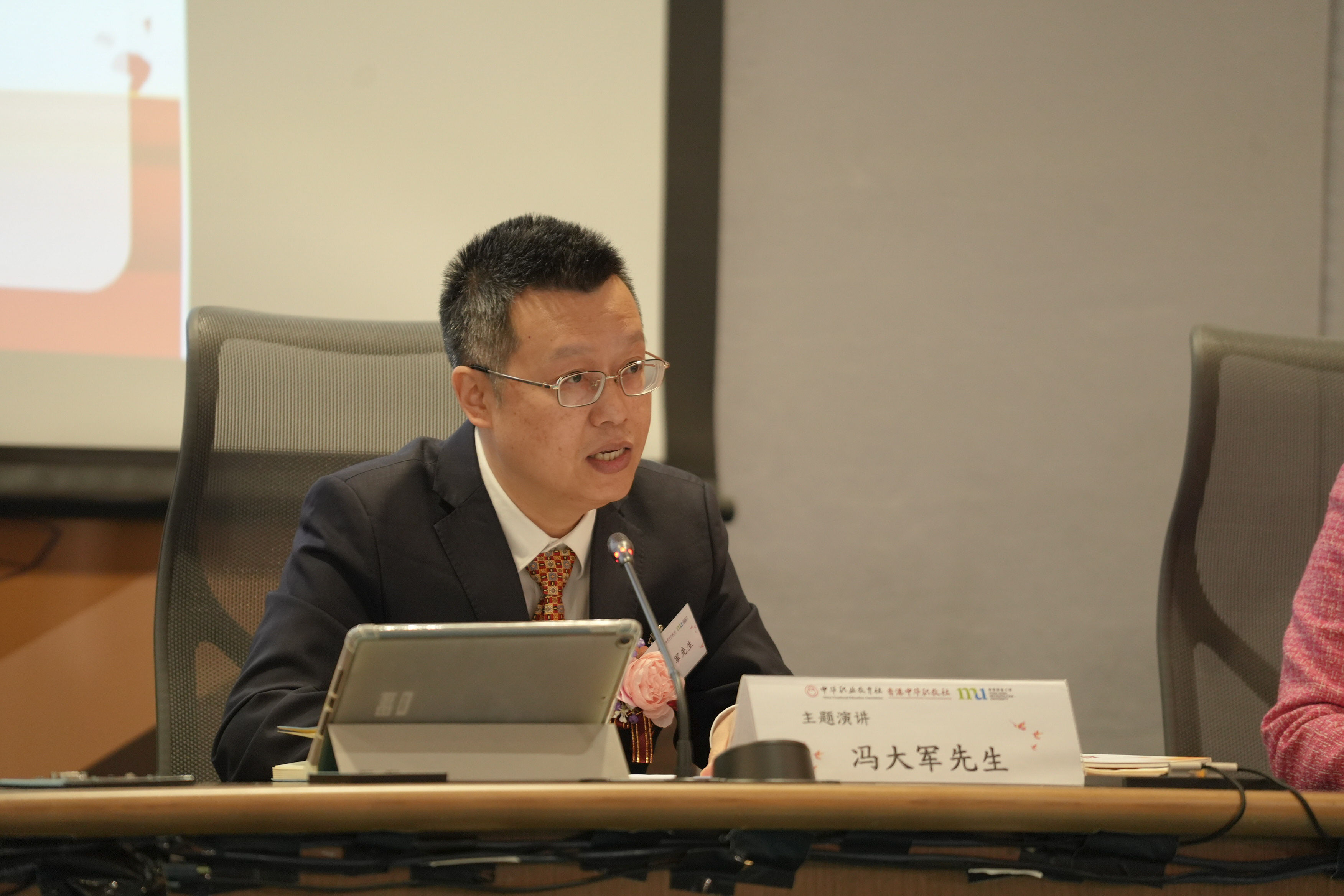 Mr. Feng Dajun, Deputy Director General of National Association of
Mr. Feng Dajun, Deputy Director General of National Association of
Vocational Education of China
Dr. Wong Yau Kar stated that from the 1980s to 2019, vocational colleges have trained over 900,000 graduates from various industries in Hong Kong. The Hong Kong SAR government has established a dedicated department to promote the development of vocational education. The Vocational Training Council (VTC) was established in 1982. The government is also vigorously promoting the establishment of the "University of Applied Sciences"(UAS), and the Metropolitan University of Hong Kong has become a UAS. The characteristic of vocational education in Hong Kong is its high degree of internationalization, and the use of English is the key to international integration. It is suggested that the development of vocational education should be based on future needs, the integration of industry and education, school enterprise cooperation, and the construction of a connected education system from middle school to university and even master's degree.
Professor Zhao Pengfei stated that apprenticeship is the best way to achieve industry education integration and school enterprise cooperation. The Chinese government policy requires all regions to actively carry out modern apprenticeship pilot programs through school enterprise joint enrollment and training. The Ministry of Education and the Ministry of Human Resources and Social Security both support the apprenticeship system. There are more than 1000 pilot projects for modern apprenticeship system in China, with 2480 cooperative enterprises, benefiting more than 100000 students (apprentices). The pilot project for new apprenticeship system in enterprises has trained more than 20000 employees, with a clear requirement to train 1 million new apprentices from 2019 to 2021. The important achievements of modern apprenticeship system pilot are government policies, industry standards, and school enterprise models. Modern apprenticeship system is a "dual education", "dual identity", "work study alternation", and "job training". It refers to “school+enterprise”, “student+apprenticeship”, “learning+work”, and “education+training” respectively. The development of apprenticeship system vertically connects the primary, middle, and high-level apprenticeship systems, and horizontally connects them to the integration of general education and vocational education.
Dr. Liu Yi Man said that Hong Kong acted as a super connector to promote the high-quality development of the "Belt and Road" vocational education. Promote China's vocational education to go overseas and help build an education powerhouse, with Hong Kong as the first stop, serving as a super connector for "going out " and "bringing in". Especially in the field of internationalization and artificial intelligence, it is very important. In the future, our country's vocational education will have great potential in international talent joint training, collaborative development of curriculum standards, and the clustering effect of overseas education. The continuous evolution of artificial intelligence technology has brought tremendous changes to the production models of various industries.
Mr. David Leung Yiu Fai said that MTR Academy was established in 2016 to cooperate with the national the Belt and Road Initiative. It is a wholly-owned subsidiary of MTR Corporation and one of the earliest corporate colleges in Hong Kong. Our vision is to become a recognized center for railway management and technical education and research in the railway industry in Hong Kong, mainland China, and overseas. Through the MTR Academy, there are also master's programs in rail transit, joint courses with overseas universities, and community participation. Currently developing consulting services for the Middle East market.
Professor Li Wai Chi said that the last era was the Internet+ era. The next era is the era of Al, make good use of Al, comprehensively popularize artificial intelligence knowledge, and improve students' artificial intelligence literacy. Relying on the platform of vocational colleges, we can use Unicom x financing to implement the policies and measures of different government departments on strengthening science and technology, education and talent. Colleges and enterprises in the two places can rely on the country and enterprises to jointly build the Belt and Road development and provide formal vocational skills training according to their human needs at different stages of development. Colleges and relevant administrative departments in both regions will jointly develop and construct an international vocational education and qualification system with Chinese characteristics.
President Chris Cheung Kin Chung of CLP Power Academy stated that the title is "Power to Move Upward". The institute is not only studying for colleagues at the CLP Power, but can also be read to public, all students are part-time students. There are currently multiple courses, QF architecture, jointly offered with universities. Due to the fact that CLP Power is the most professional in the enterprise/industry, but not the most specialized in teaching, it is best to cooperate with universities to provide scenes for students to understand operations. Collaboration with VTC, some transitional courses, these courses form an ecosystem. Entering the mechanical and electrical industry, seeking opportunities to move upstream is to obtain a diploma (educational background). In addition to the diploma, there is also an exemption from the electrician license (industry qualification), which creates an ecological environment. Partners include the Electrical and Mechanical Services Department, the Hong Kong Council for Accreditation of Academic and Vocational Qualifications, and the Hong Kong Institution of Engineers.
Dr. Liu Yung Chau expressed his gratitude during his closing remarks at the symposium. 2024 is the most important year in the development of the COEAHK. The inauguration ceremony was taking place on 12 January 2024. Both governments attach great importance to it, and Chief Secretary for Administration of HKSAR Mr. Chan Kwok-ki, Dr. Choi Yuk-lin, Secretary for Education, and Professor Sun Dong, Secretary for Innovation, Technology and Industry, all attended. The leaders of the National Association of Vocational Education of China visited Hong Kong this time, with the theme of the forum, "Building the Belt and Road through Hong Kong's Vocational Education Services," reflect a commitment to the strategic importance of vocational education in the Belt and Road Initiative. The first three speakers including Deputy Director General Feng Dajun, Dr. Wong Yau Kar, and Professor Zhao Pengfei giving keynote speeches from the three dimensions of "Vocational Education Going overseas", "Vocational Education Jointly Building the the Belt and Road" and "Integration of Industry and Education". Mr. David Leung Yiu Fai, Professor Li Wai Chi, President Chris Cheung Kin Chung and Dr. Liu Yi Man participated in the symposium to promote vocational education in Hong Kong and participate in the national strategy of the Belt and Road from the perspective of enterprises and educational institutions.
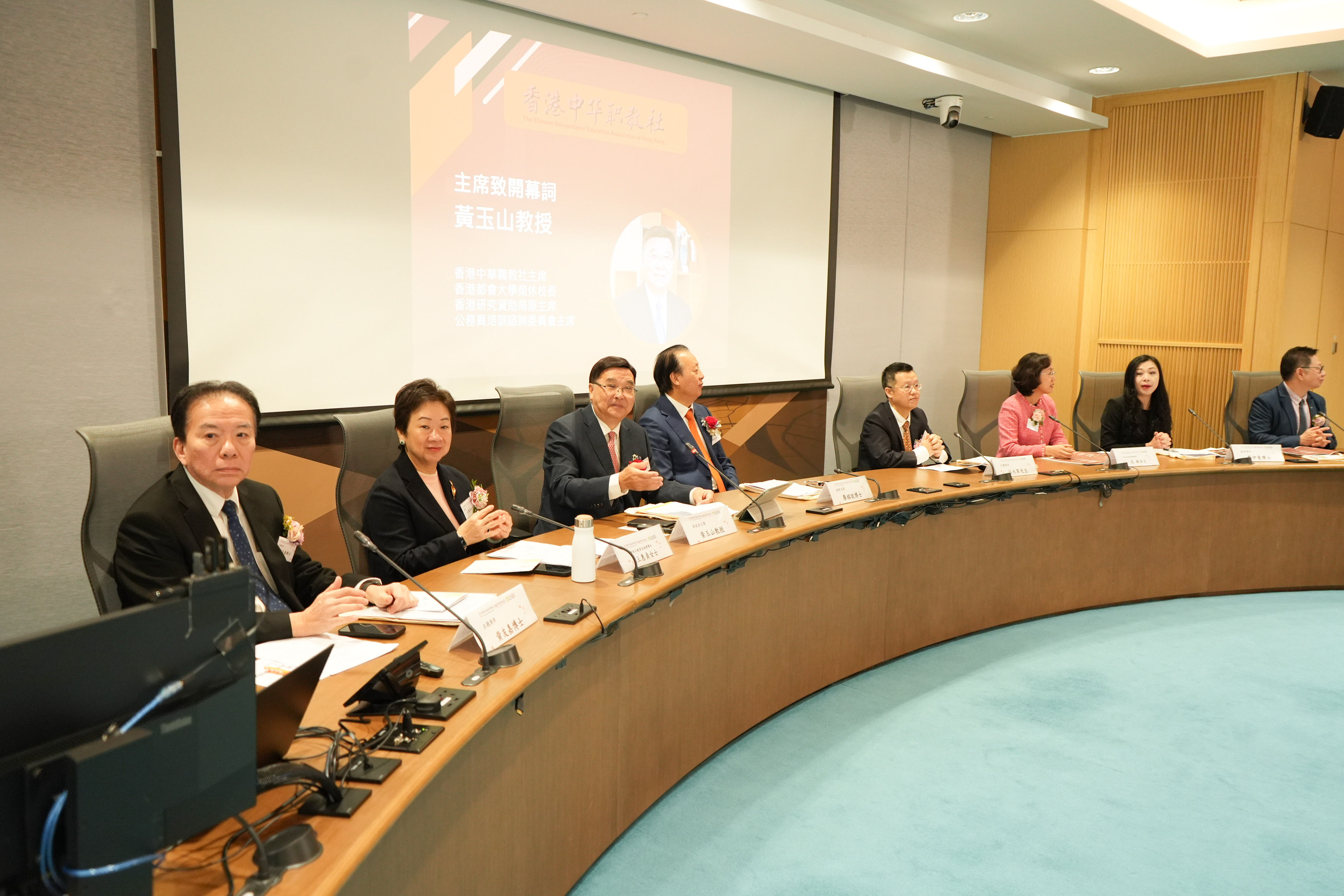 Group Photo: From Left Dr. Wong Yu Kar, Madam Wang Wai Ching, Professor
Group Photo: From Left Dr. Wong Yu Kar, Madam Wang Wai Ching, Professor
Wong Yuk Shan, Dr. Liu Yung Chau, Mr. Feng Dajun, Madam Wu Cheng,Dr. Liu Yi
Man, Professor Reggie Kwan Ching Ping